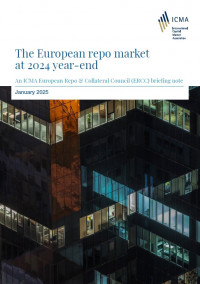ICMA ERCC publishes its analysis of the repo market at 2024 year-end
 29 January 2024 ICMA's European Repo and Collateral Committee (ERCC) has published its annual analysis of how the repo market performed over the recent year-end: The European repo market at 2024 year-end.
29 January 2024 ICMA's European Repo and Collateral Committee (ERCC) has published its annual analysis of how the repo market performed over the recent year-end: The European repo market at 2024 year-end.
Calendar year-end has become a major focal point for repo markets, associated with thin liquidity and heightened rate volatility, and working with its European Repo and Collateral Council (ERCC), ICMA has conducted its assessment of market performance over this period since 2016. The legacy of this particularly stressed turn is still felt today in terms of how and when market participants manage their anticipated year-end funding needs.
The report looks not only at the Euro government repo market, but also those for GBP, USD, and JPY.
The latest report describes how 2024 year-end was, in many respects, different to previous year-ends. As usual, focus on the so-called “turn” began in October, with term and forward trades beginning to price in liquidity premium for December 31 to January 2 (a two-day turn). Unlike recent years, particularly in the case of EUR, the markets began pricing repo rates at a significant premium to benchmark rates, rather than the usual deep discount. This was observed over the September quarter-end, when repo rates spiked higher, and was largely seen as a return to normalisation, with reduced excess liquidity and increased bond issuance tilting the demand-supply dynamic. At the same time, there was growing concern about the increased pressure on the largest G-SIB banks as a result of the soaring stock market, particularly following the November US election result, which was increasing the demand for prime brokerage balance sheet to fund swelling hedge fund longs, and likely to be at the expense of repo funding capacity for fixed income.
However, as we moved into December the pressure began to abate, and rates began to move closer to normal levels. This was partly as many firms had already locked in much of their year-end funding, but also as it became clearer that there was ample liquidity in the market. A number of other factors helped, including a change in market position in government bond markets, as well as the sell-off in the equity markets following the December FOMC.
While much of the discourse over recent years has been on demand-supply imbalances in the repo market at year-end, with the banking system flooded with excess reserves and the market facing collateral scarcity, as ICMA’s annual analysis has shown, the main driver of the year-end effect is in fact balance sheet scarcity; which is much more difficult to predict.







